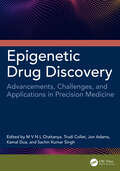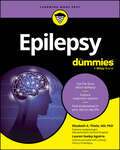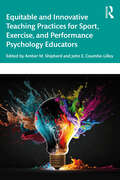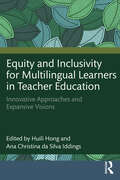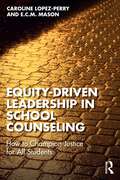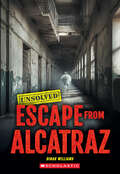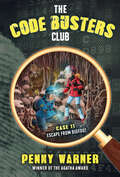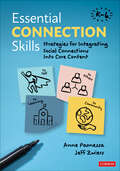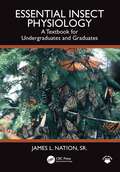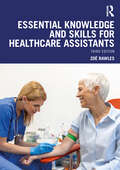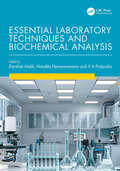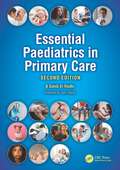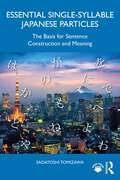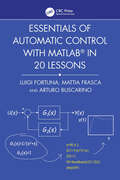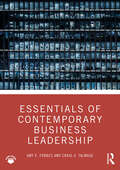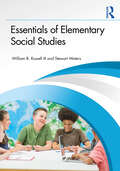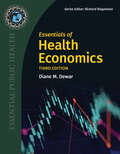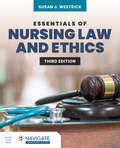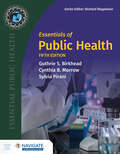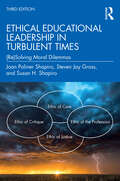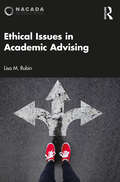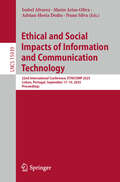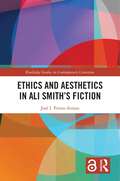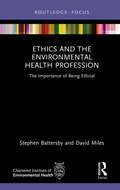- Table View
- List View
Epigenetic Drug Discovery: Advancements, Challenges, and Applications in Precision Medicine
by Jon Adams Kamal Dua Trudi Collet Sachin Kumar Singh M V N L ChaitanyaThis book reviews the evolving field of epigenetics and its implications for drug discovery and precision medicine. It also focuses on the intricate mechanisms governing gene regulation and the impact of epigenetics on health and disease. The book encompasses the complexities of epigenetic mechanisms and their role in diseases such as cancer, autoimmune disorders, inflammatory conditions, and neurodegenerative diseases. Additionally, it examines the role of miRNA as an epigenetic drug in treating cancer and in-silico approaches to epigenetic drug discovery. The book uncovers the potential of epigenetic drug discovery, including insights into traditional medicine, marine sources, and OMICS technologies. Moreover, it explores the interplay between gut microbiota, probiotics, and prebiotics in epigenetic therapeutic approaches. With a focus on personalized medicine and recent advancements in drug delivery systems, this book is intended for researchers, clinicians, and pharmaceutical professionals seeking to explore epigenetic drug discovery and development.Key features Discusses the implications of epigenetic mechanisms in different diseases and epigenetic based drug discovery Reviews development of targeted therapies based on epigenetic mechanisms for cancer, autoimmune diseases, neurodegenerative conditions, and inflammatory diseases Emphasizes the importance of precision medicine and personalized therapies based on epigenetic profiling Explores application of artificial intelligence in designing novel delivery systems for epigenetic drugs Presents role of advance in-silico and drug discovery tools in the development of epigenetic drugs
Epilepsy For Dummies
by Elizabeth A. Thiele Lauren Seeley AguirreA conversational guide to understanding and living with epilepsy Millions of people around the world have epilepsy, but the condition is widely misunderstood. Epilepsy For Dummies breaks through outdated stigmas surrounding this complex neurological disease. The book offers a 360-degree view by incorporating medical, social, and other perspectives to help you cope with epilepsy or support someone who has been diagnosed. You'll learn about triggers and risk factors, different types of seizures, and getting a diagnosis. You'll also explore various treatment options, including medications, surgery, therapy, and neuromodulation. Beyond the basics, this guide addresses staying safe and managing associated conditions, empowering you to live well. Get up-to-date facts about epilepsy, written in terms anyone can understand Learn about the causes, symptoms, and treatments for different seizure types Discover how family and friends can support their loved ones with epilepsy Find advice for feeling in control and living a fulfilling life Epilepsy For Dummies is invaluable for anyone with epilepsy, as well as their caretakers, family, and friends. It's also a great resource for educators and medical professionals.
Equitable and Innovative Teaching Practices for Sport, Exercise, and Performance Psychology Educators
by Amber M Shipherd Coumbe-Lilley, John EEquitable and Innovative Teaching Practices for Sport, Exercise, and Performance Psychology Educators addresses the need for a resource on practical learning and assessment activities for face-to-face and online instruction in sport, exercise, and performance psychology. Specifically, this book provides readers with evidence-based strategies for addressing classroom challenges, namely those that the COVID-19 pandemic brought to the forefront, including flexible yet equitable teaching practices, student engagement both in and outside of the classroom, building connections in the online or hybrid classroom, and innovative techniques, activities, assessments, and course design approaches. The sport, exercise, and performance psychology field demands that educators help learners translate evidence into practice and recognize relationships between science, application, and reflection. Tomorrow’s learners will require instructional approaches that engage them and increase their awareness, knowledge, and skill development so that their experience is rich, deep, and memorable.Equitable and Innovative Teaching Practices for Sport, Exercise, and Performance Psychology Educators bridges the gap between pre- and post-pandemic teaching and learning practices that provide educators with strategies and tools to equip them for tomorrow’s students and is key reading for graduate students, young professionals, or experienced educators in the field of sport, exercise, and performance psychology. Active professionals in the broader fields of psychology, kinesiology, coaching, counselling, or education who may teach sport, exercise, and performance psychology courses or students will also find this new book a valuable resource.
Equity and Inclusivity for Multilingual Learners in Teacher Education: Innovative Approaches and Expansive Visions
by Huili Hong Ana Christina da Silva IddingsThis textbook equips pre-service educators with the tools they need to empower multilingual learners, their families, and communities; promote educational equity; and advocate for the rights of multilingual learners in increasingly complex sociopolitical settings. Featuring contributions from researchers, in-service teachers, pre-service teachers, and community leaders, the book offers expansive and diverse perspectives on the challenges and solutions related to multilingual learners in a myriad of educational contexts and environments. The book goes beyond traditional classroom strategies to cultivate all participants’ active agency and incorporate advocacy for both teachers and multilingual learner students, exploring the intricate connections between praxis and community engagement in a comprehensive way. Addressing a wide array of increasingly common challenges, this thoughtful resource is ideal for undergraduate and graduate students in teacher education and educational leadership preparation programs, as well as teacher researchers and school administrators.
Equity-Driven Leadership in School Counseling: How to Champion Justice for All Students
by Caroline Lopez-Perry E.C.M. MasonDrawing from the authors’ experience as former school counselors, their research on school counselor leadership and advocacy, and their professional advocacy work, this book provides insights and strategies to develop school counselors’ leadership skills.This book is divided into two parts. The first part focuses on self-reflection and critical consciousness for school counselors. It challenges their understanding of leadership and urges them to critically examine whether their personal definition of leadership aligns with the needs of diverse students and the broader educational context. Chapter topics include leadership and liberation, the limits of traditional leadership theories, leading with emotional intelligence, and the courage to confront systems of oppression. The second part calls the reader toward critical action and engagement in social and political activity and advocacy with the intent to disrupt and change perceived inequalities. Specific topics include developing political skills, addressing resistance to change, and developing collaborative relationships.School counselors will find this book filled with the necessary knowledge and skills to effect change in schools, districts, and the public arena for the benefit of P-12 students, particularly those from historically marginalized populations.
Escape from Alcatraz (Unsolved)
by Dinah WilliamsDid any prisoners ever escape Alcatraz? Discover the unsolved mystery in this beautifully illustrated book for kids, accessible for all readers!Alcatraz, once the world's most secure prison, is located on a small island in San Francisco Bay. Throughout its operation, many attempted to escape. In June 1962, three prisoners managed to break out, but they were never heard from again. What happened to them?Discover this unsolved mystery with real clues, facts, and pictures in the pages of this book. The story will unfold with easy-to-read text and exciting visuals. You can decide for yourself what you think happened during this mysterious escape from Alcatraz!ABOUT THIS SERIES:Take a deep dive into some of the most unbelievable but real unsolved mysteries from history. Is the Bermuda Triangle cursed? Do sea monsters exist? Can people just disappear? Each book in this series focuses on one unsolved mystery and describes its main events chronologically. Readers follow along as the exciting narrative uncovers real historical clues. Multiple theories are presented, providing an opportunity for readers to draw their own conclusions. The most up-to-date facts and relevant modern-day discoveries are included to allow for real-world connections. Perhaps you will be the one to solve an unsolved mystery!
Escape from Bigfoot (The Code Busters Club #11)
by Penny WarnerIt’s time for a field trip to Gold Country! Cody, Quinn, Luke, M.E., and Mika are the Code Busters—clever clue hunters with a passion for puzzles. The group of friends are excited to explore caves and learn about the gold rush, all while solving codes. But when Matt the Brat plays tricks on them and Cody starts seeing a mysterious figure with glowing red eyes, their field trip takes a turn. Will the Code Busters be able to figure out who the figure is and what it wants? And will they maybe even find Bigfoot?
Essential Connection Skills, K-6: Strategies for Integrating Social Connections Into Core Content
by Jeff Zwiers Anne Paonessa"Essential Connection Skills is a practical, specific, inspirational, and must-have resource for any teacher, coach, school leader, or parent who aims for a more empowered and successful student." Julie O′Connell Alholm, Instructional Coach and EL Teacher, MN "Essential Connection Skills is a must-read for any teacher—whether you′re already focused on social skills or looking to include them more in your teaching. The suggestions in each chapter are practical for novice to veteran teachers." Amber Quirk, Regional Superintendent, DuPage County Regional Office of Education, IL Foster joy and engagement by building community in your school and classrooms Do your students struggle with low boredom tolerance, lack the confidence and skills needed in social interactions, or find it hard to collaborate? Are you seeing more behavioral disruptions, a wider range of learning challenges, and increased absenteeism? Today’s classrooms need to move beyond traditional teaching methods; they need strategies that will re-engage students and build on meaningful connections. Essential Connection Skills offers practical solutions to help educators reignite the joy of learning through purposeful, reflective interactions. These strategies empower students to build connections, embrace multiple perspectives, and develop the social and academic tools necessary for success. Inside you′ll find: Chapter-by-chapter resources and techniques Assessment recommendations Targeted strategies for culturally and linguistically diverse students Techniques to help students develop self-reflection skills By cultivating authentic engagement, Essential Connection Skills restores a sense of community and purpose in classrooms and empowers students with the lifelong skills they’ll need to succeed. Other Books from Corwin Dohrer, The Schools We Need Now Rogers, The SEL Coach
Essential Connection Skills, K-6: Strategies for Integrating Social Connections Into Core Content
by Jeff Zwiers Anne Paonessa"Essential Connection Skills is a practical, specific, inspirational, and must-have resource for any teacher, coach, school leader, or parent who aims for a more empowered and successful student." Julie O′Connell Alholm, Instructional Coach and EL Teacher, MN "Essential Connection Skills is a must-read for any teacher—whether you′re already focused on social skills or looking to include them more in your teaching. The suggestions in each chapter are practical for novice to veteran teachers." Amber Quirk, Regional Superintendent, DuPage County Regional Office of Education, IL Foster joy and engagement by building community in your school and classrooms Do your students struggle with low boredom tolerance, lack the confidence and skills needed in social interactions, or find it hard to collaborate? Are you seeing more behavioral disruptions, a wider range of learning challenges, and increased absenteeism? Today’s classrooms need to move beyond traditional teaching methods; they need strategies that will re-engage students and build on meaningful connections. Essential Connection Skills offers practical solutions to help educators reignite the joy of learning through purposeful, reflective interactions. These strategies empower students to build connections, embrace multiple perspectives, and develop the social and academic tools necessary for success. Inside you′ll find: Chapter-by-chapter resources and techniques Assessment recommendations Targeted strategies for culturally and linguistically diverse students Techniques to help students develop self-reflection skills By cultivating authentic engagement, Essential Connection Skills restores a sense of community and purpose in classrooms and empowers students with the lifelong skills they’ll need to succeed. Other Books from Corwin Dohrer, The Schools We Need Now Rogers, The SEL Coach
Essential Insect Physiology: A Textbook for Undergraduates and Graduates
by James L. Nation, Sr.This textbook is the first to teach insect physiology and biology specifically to students who lack a strong background in biochemistry and molecular biology. Avoiding taxonomic language and supported with high‑quality figures, chapter summaries, end‑of‑chapter review questions, and a suite of PowerPoint slides for use in teaching, it describes the fundamental processes. These include molting and metamorphosis, digestion of food, nerve and muscle function, flight, biological rhythms, circulation and breathing, immunity, how climate and climate change have, and are, affecting insects, and the use of new manipulation of the genome in insect biology and control.Introducing the topic with the story of insect development in Chapter 1, this text makes insect physiology and biology genuinely interesting to students, right through to the final chapter, which discusses studies in editing the insect genome.
Essential Knowledge and Skills for Healthcare Assistants
by Zoë RawlesThis revised edition of Essential Knowledge and Skills for Healthcare Assistants is an accessible and comprehensive text designed to equip you with the necessary skills for your practice. This book equips you with the knowledge to provide the safest and most effective patient care possible and supplies comprehensive coverage of both primary and secondary care settings, with an emphasis on primary care. It provides evidence-based guidelines to ensure best practice that is matched to the National Occupational Standards, the Care Certificate and the qualification frameworks from around the United Kingdom (UK).The third edition includes the following:• an all-new chapter on safeguarding and expanded coverage on communication skills;• a comprehensive overview of the principal clinical skills that healthcare assistants (HCAs) need to master, including understanding physiological measurements, taking blood pressure, venepuncture, urinalysis, wound care, administering injections, and more;• essential non-clinical knowledge and skills such as communication and assertiveness, reflection, accountability, confidentiality and recordkeeping, health promotion, infection control, and more;• the evolving role of the healthcare assistant and training opportunities; and• application to practice throughout, with numerous case studies and activities to aid understanding.This is an essential guide for all those training as healthcare assistants, nursing associates and assistant practitioners, and a useful reference for students embarking on nursing, and health and social care programmes.
Essential Laboratory Techniques and Biochemical Analysis
by Darshan Malik Nandita Narayanasamy V A PratyushaThis laboratory manual comprehensively reviews essential laboratory practices and different biochemistry protocols. The initial chapters of the book provide an overview of lab safety protocols, focusing on the importance of accuracy and precision in experimental procedures. It covers essential topics, such as laboratory setup, proper handling and maintenance of lab apparatus, and waste disposal. It provides a detailed exploration of spectrophotometry principles and assays, along with comprehensive cell biology techniques, including staining and microscopy. The book also addresses qualitative and quantitative analyses of carbohydrates, amino acids, proteins, and lipids, providing methods for extraction and characterization. It further details the extraction, purification, and characterization of enzymes and presents enzymatic assays and studies on enzyme kinetics, providing a comprehensive understanding of enzyme activity and regulation. The final section introduces hematology techniques, including blood smear preparation and various blood parameter determinations. It also covers forensic tests for blood detection and serum protein electrophoresis. This book is useful for graduate and postgraduate students of biochemistry, molecular biology, and microbiology.
Essential Paediatrics in Primary Care
by A Sahib El-RadhiEssential Paediatrics in Primary Care covers the breadth of paediatric practice, written with the frontline experience of the challenges and dilemmas faced in diagnosing and treating children in primary care in mind. The practical text continues to offer clear, evidence-based guidance about managing children in primary care, including when referral to hospital is appropriate, and has been fully revised and updated in this second edition. The concise, list-based format facilitates a confident and knowledgeable diagnosis to be reached in the short time available in general practice.Key Features: General practice specific – allows for rapid diagnosis in the short time available to busy GPs during the consultation and includes explanations for investigations relevant to primary care Clear, practical and concise guidance in a quick reference format, making extensive use of tables and lists throughout and featuring red flags, key points and 'top tips' to ensure knowledge is effectively retained and prioritized Written by a highly qualified author blending extensive clinical and teaching expertise in both general practice and paediatrics with current experience as a GP trainee undertaking qualifying examinations Draws on information obtained from authentic and highly regarded sources This book is invaluable for general practitioners and GP trainees wanting to keep abreast of recent progress in paediatric care and in preparation for Membership of the Royal College of General Practitioners (MRCGP) and similar qualifying specialist examinations, is an ideal aide-mémoire for nurse practitioners and health visitors and a useful guide medical students and junior doctors considering a career in general practice.From the Foreword to the First Edition:'Anyone practising generalist paediatrics should have the material within these chapters either hard-wired in, or at the fingertips. This book is ideal for the primary care bookshelf...The authors have ensured that clinicians' paediatric knowledge and skills can only grow with familiarity of their material.'John Spicer, GP and Medical Educator, London
Essential Single-Syllable Japanese Particles: The Basis for Sentence Construction and Meaning
by Sadatoshi TomizawaUnlike traditional Japanese particle reference books, Essential Single-Syllable Japanese Particles is a revolutionary hybrid: a functionality-based guide and workbook designed to deconstruct and conquer the complexities of the 14 most commonly used single-syllable Japanese particles, such as は/wa, が/ga, で/de, の/no, and に/ni. Unlike their easily translatable multi-syllable counterparts like から/kara meaning "from" or ので/node "because", these single-syllable powerhouses often defy direct translation and carry a variety of functions, even sometimes within the same sentence. Readers are encouraged to dive deep into their multiple roles, understand their nuances, and master them through targeted exercises. This innovative approach unlocks the secrets of these multifaceted particles, paving the way for confident and fluent Japanese communication. This book is for teachers and learners alike, and comes with many online audio resources to further engage the learning process.
Essentials of Automatic Control with MATLAB in 20 Lessons
by Luigi Fortuna Arturo Buscarino Mattia FrascaThis book is designed to explain the fundamental principles of automatic control through 20 lessons, each incorporating worked examples and MATLAB®-based exercises to help readers effectively understand and apply the proposed methods. It offers a concise and accessible resource for learning automatic control, blending simplicity with clarity. Drawing on decades of teaching experience, the authors aim to provide an approachable introduction to the core concepts of the discipline, encouraging further exploration through independent study. Integrates MATLAB® within a 20-lesson framework Enhances learning by supporting both theoretical understanding and practical problem-solving Promotes critical thinking and problem-solving skills, essential competencies in today's AI-driven world. Focuses on classical topics related to Single-Input Single-Output (SISO) linear continuous-time systems Provides introductory material on topics such as Multiple-Input Multiple-Output (MIMO) and discrete-time systems, serving as a bridge to more advanced studies. By establishing a strong foundation in these areas, the book prepares readers to tackle complex challenges in modern automatic control and excel in future academic and professional endeavors. Primarily intended for undergraduate engineering students, the book is also suitable for a wider audience. As automatic control is a foundational subject across numerous academic programs, this resource equips readers with essential analytical tools and introduces key problems, fostering deeper insights into the subject.
Essentials of Contemporary Business Leadership
by Amy E. Forbes Craig A. TalmageEssentials of Contemporary Business Leadership provides contemporary tools for the next generation of aspirational leaders to fully meet their potential and optimise group performance.The highly experienced authors utilize their own ‘Contemporary Leadership Dimensions’ model, which provides flexible and creative ways to enhance leadership learning. The book goes through the components of the model sequentially: self-leadership; people leadership, business leadership; client leadership; and finally, community leadership. This progressive approach effectively allows readers to build their knowledge and pull threads of learning into the next component of the unique model. Each chapter also features cases studies, multiple interactive exercises and discussion questions which helps complete understanding from theory to practice.This is an ideal text for students starting their leadership journey, or for practitioners hoping to improve their leadership and management skills.Online resources will include additional exercises to augment learning.
Essentials of Elementary Social Studies
by Stewart Waters William B. Russell IIIEssentials of Elementary Social Studies is a teacher-friendly text that provides comprehensive treatment of classroom planning, instruction, and strategies. Praised for its dynamic approaches and a writing style that is conversational yet professional, this book enables and encourages educators to effectively teach elementary social studies using creative and active learning strategies. This seventh edition has been refined with new and relevant topics and strategies needed for effectively teaching elementary social studies. Updates include: A refreshed chapter on technology designed to better prepare elementary teachers to effectively incorporate technology, including artificial intelligence, into social studies instruction while understanding the benefits and dangers New classroom-tested, elementary-appropriate lesson plans for each grade level (K-6), in keeping with the book’s emphasis on planning and teaching New discussions on promoting inclusive practices in the classroom and supporting neurodiverse students and students with learning disabilities Additional attention to discussions around citizenship for younger grades New and revised case studies New "Checking for Understanding" sections at the end of each chapter that offer comprehension, application, and reflection on key concepts throughout the chapters Supplemental digital and video sources related to various topics throughout the chapter Full of practical guidance for K-6 teaching, Essentials of Elementary Social Studies is essential reading for pre-service teachers in Social Studies Education and Elementary Education as well as in-service elementary social studies teachers.
Essentials of Health Economics, Third Edition
by Diane M. DewarWritten with the non-specialist in mind, Essentials of Health Economics, Third Edition examines the public health care system through the lens of economic theory. Through numerous examples, case studies, and profiles related to the field, students will learn the importance of health economics and its relevance to more general analysis of health policy issues.With new information on healthcare reforms faced at the state, national, and international level, new chapter on COVID,19, fresh profiles of notable economists, updated statistics, and more, the Third Edition provides a timely and accessible introduction that focuses on how to do descriptive, explanatory, and evaluative economics in a systematic way. Learn more about Third Edition in this video interview with Diane Dewar. New chapter on COVID-19 that provides a case study in emergency preparednessExpanded chapters on technology and health care workforce discuss the roles of digital health and physician extenders, respectivelyNational and international comparisons provided throughout given the global nature of health and healthcareNewly updated chapters in health care reform in national, state, and international realmsUpdated statistics and current events in policy and economics throughout End-of-chapter real world case studies encourage for application of principles discussed in each chapterUpdated and/or new notable economist profiles for students to learn about the field of health economics Health Economics courses in programs of public health, health administration, nursing, pharmacy and other allied health professions. © 2026 | 200 pages
Essentials of Nursing Law and Ethics
by Susan J. WestrickEssentials of Nursing Law and Ethics continues its focus on the legal aspects of Nursing as it relates to patient safety and quality, environmental health and safety, error reduction and ethical boundaries of practice in an updated third edition. Written by a nurse attorney, this unique text presents complex topics to undergraduate nursing students in an understandable manner while providing accurate and well researched content relevant to nursing practice. The Third Edition was thoughtfully revised and updated to incorporate gender neutral, inclusive, patient-centered and person-first language throughout. Furthermore, it features new and updated case law examples and updated coverage of timely topics, including documentation, patient teaching, confidentiality, end of life issues, advance directives, refusing a patient assignment, sexual harassment in the workplace, use of social media by nurses, error reduction/disclosure, correctional nursing, age discrimination, the ADA, and more.
Essentials of Public Health
by Cynthia B. Morrow Guthrie S. Birkhead Sylvia PiraniEssentials of Public Health, Fifth Edition is a thorough introduction to the field of public health, blending public health practice concepts, government public health, and careers in public health.Using the concept of Public Health 3.0 (a set of aspirational goal to move the public health system into the future), the first section delves into foundational public health principles, governmental structures, healthcare relationships, and pandemic preparedness, offering a thorough understanding of the field. The second section uniquely highlights various public health occupations and careers, equipping readers with an understanding of the diverse roles within the public health workforce. Covers the latest trends and concepts including the 10 Essential Public Health Services (EPHS), Health People 2030, health equity, and more.Offers a new chapter (6) entitled Pandemic and All-Hazards Public Health Preparedness which emphasizes the critical lessons learned from the COVID-19 pandemic and highlights the essential role of public health in safeguarding community health during emergencies.Uniquely explores public health careers, offering 6 job-specific chapters covering careers in Public Health Administration, Environmental & Occupational Health; Public Health Nursing; Epidemiology & Statistics and more. Features updated tables, figures, and weblinks throughout the text illustrate key concepts and provide useful resources. Includes revised and expanded "Outside-the-book" thinking exercises as well as discussion questions to engage students further. Introductory Public Health courses in Public Health, Nursing, and other health disciplines. © 2026 | 350 pages
Ethical Educational Leadership in Turbulent Times: (Re) Solving Moral Dilemmas
by Steven Jay Gross Joan Poliner Shapiro Susan H. ShapiroEducational leaders not only face moral and ethical decisions regarding their classrooms, schools, districts, and education institutions, but they also must consider the complexities and threats that impact their communities. Amidst the ongoing challenges of pandemics and natural disasters, this process is exceptionally daunting. Ethical Educational Leadership in Turbulent Times is an engaging, case-study-based text that assists leaders in their ethical decision-making processes during a time of turbulence and uncertainty. The book is framed by Gross’ Turbulence Theory and Shapiro and Stefkovich’s Multiple Ethical Paradigms of justice, critique, care, and the profession. Presenting clear explanations of theory in combination with authentic dilemmas developed by practitioners, this book will assist leaders in dealing with challenging situations in their own settings. Ethical Educational Leadership in Turbulent Times, 3rd edition is a valuable book for both aspiring and practicing educational administrators and leaders.New in this edition: Updated cases throughout to reflect contemporary issues and recent scholarship in the field New topical case coverage on topics relating to the post-pandemic climate, race and ethnicity, social media, and culturally sensitive teaching An entirely new chapter with cases about technology, including the strengths and weaknesses of AI in education
Ethical Issues in Academic Advising
by Lisa M. RubinThis foundational resource provides a comprehensive exploration of ethical challenges in academic advising, collating with decision-making frameworks informed by best practice and theory.The daily decisions of academic advisors are rooted in ethical issues that impact students, faculty, other advisors, and the greater institution at large. Authored by a leading academic advising scholar-practitioner with two decades of experience, this book defines ethics, explains why it is important, and outlines how to make ethical decisions in an academic advising context. Case studies and reflection questions engage readers through real-world application and help make sense of new approaches and ways of thinking to support students.The fundamental knowledge and practical guidance contained in this book will empower new, seasoned, and aspiring academic advisors to feel confident and prepared to make sound decisions when faced with a diverse range of ethical dilemmas.For information and resources about academic advising or to become a member of NACADA, please visit https://nacada.ksu.edu/.
Ethical and Social Impacts of Information and Communication Technology: 22nd International Conference, ETHICOMP 2025, Lisbon, Portugal, September 17–19, 2025, Proceedings (Lecture Notes in Computer Science #15939)
by Adrian-Horia Dediu Nuno Silva Isabel Alvarez Mario Arias-OlivaThis book constitutes the refereed proceedings of the 22nd International Conference on Ethical and Social Impacts of Information and Communication Technology, ETHICOMP 2025, held in Lisbon, Portugal, during September 17–19, 2025.The 51 full papers presented in this volume were carefully reviewed and selected from 165 submissions. The papers are organized in the following topical sections: Ethics, Society; Eduction; Systems; and Security.
Ethics and Aesthetics in Ali Smith’s Fiction (Routledge Studies in Contemporary Literature)
by José I. Prieto-ArranzThis study offers a fresh perspective on Ali Smith’s work, analysing her fiction through a truly interdisciplinary lens. José I. Prieto-Arranz explores Smith’s engagement with contemporary issues such as digital violence, disinformation, pornography, nationalism, climate change, discrimination, and social fracture. Simultaneously, this book examines Smith’s unique stylistic choices, including her use of magical realism, intertextuality, and intermediality, to reveal the intricate connection between the ethical and aesthetic dimensions of her novels. Through close readings of Smith’s novels, from Like to Companion Piece, enriched with insights from her prolific short fiction, the author demonstrates how Smith constructs a “text continuum,” revealing recurrent themes and stylistic choices that underline her firm belief in the transformative power of fiction and, by extension, art. This book will appeal to scholars of contemporary literature, art theory, political science, sociology and cultural studies, and anyone interested in literature and social commentary.
Ethics and the Environmental Health Profession: The Importance of Being Ethical (Routledge Focus on Environmental Health)
by Stephen Battersby David MilesProviding an exploration of the discussion on how a stronger ethical basis for the work of environmental health practitioners (EHPs) can contribute to improved public health, because EHPs/environmental health officers (EHOs) come into daily contact with members of the public to address threats to their health and wellbeing. This book examines what is meant by professional ethics and the role of professional bodies in ensuring members of the profession act ethically. They should be expected to act as guardians of the public interest, without fear or favour. Ethics is an integral part of public health decision-making and needs to be incorporated into public and environmental health policy development and decision-making. This work, while seeking to stimulate debate within the environmental health profession, will examine what this means for EHPs.Ethics and the Environmental Health Profession: The Importance of Being Ethical explores the process of ethical decision-making in the environmental health profession and asks the question of whom EHPs have an ethical duty towards in their work. It looks at a variety of ethical issues which arise for EHPs working in local government, as consultants or for commercial companies.This book is useful for EHPs globally, other local government officers, educational establishments where environmental and public health courses are run globally, elected members of local authorities, and policymakers at national and local government levels.
